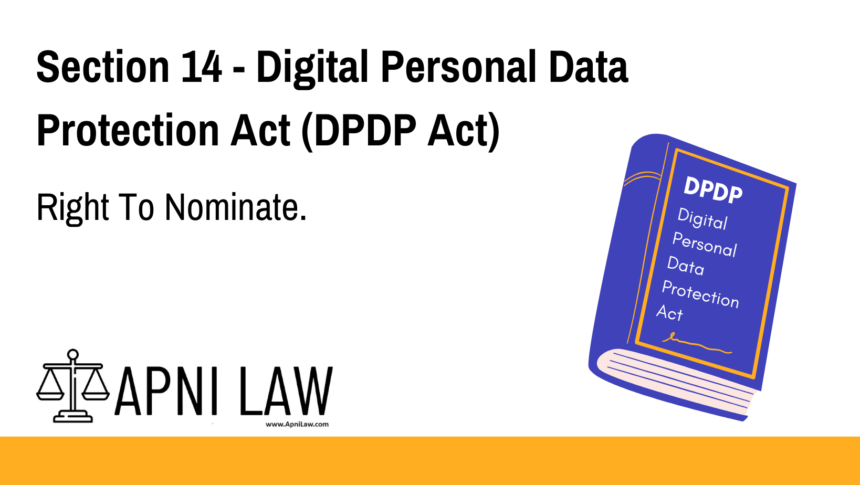Code: Section 14 DPDP
(1) A Data Principal shall have the right to nominate, in such manner as may be
prescribed, any other individual, who shall, in the event of death or incapacity of the Data
Principal, exercise the rights of the Data Principal in accordance with the provisions of this
Act and the rules made thereunder.
(2) For the purposes of this section, the expression “incapacity” means inability to
exercise the rights of the Data Principal under the provisions of this Act or the rules made
thereunder due to unsoundness of mind or infirmity of body.
Explanation of Section 14 DPDP
Section 14 of the Digital Personal Data Protection Act (DPDP) provides the Data Principal with the right to nominate another individual who will be able to exercise the Data Principal’s rights in case of death or incapacity. This ensures that the personal data rights of the individual are protected, even when they are unable to exercise them themselves.
Key Provisions:
- Right to Nominate (Sub-section 1):
The Data Principal can nominate an individual who will be able to exercise their rights in case of death or incapacity. This provides continuity in the exercise of rights even when the Data Principal is unable to act. - Definition of Incapacity (Sub-section 2):
“Incapacity” refers to the inability of the Data Principal to exercise their rights under the Act due to unsoundness of mind or physical infirmity. This definition clarifies the scope of the right to nominate.
Illustration
Example 1: Nominating a Representative
Ravi, concerned about his personal data management, nominates his sister Sita to exercise his rights if he becomes incapacitated. This ensures that Sita can act on his behalf in matters related to his personal data, if necessary.
Example 2: Death of a Data Principal
Aditi has nominated her trusted friend Neha to manage her personal data rights. Upon Aditi’s death, Neha is able to act on her behalf to manage her personal data in accordance with the provisions of the DPDP Act.
Common Questions and Answers on Section 14 DPDP
1. Can a Data Principal change their nominee?
- Answer: Yes, a Data Principal can change their nominee, following the prescribed procedure.
2. Who can be nominated by the Data Principal?
- Answer: The Data Principal can nominate any individual, provided they have the legal capacity to exercise the rights on behalf of the Data Principal in case of death or incapacity.
3. What happens if a Data Principal has not nominated anyone?
- Answer: If the Data Principal has not nominated anyone, the right to exercise their personal data rights would typically pass to their legal heirs or guardians, subject to the applicable legal provisions.
4. Does the nominee have access to all the rights of the Data Principal?
- Answer: Yes, the nominee has the authority to exercise the rights of the Data Principal as provided under the DPDP Act.
5. Does the right to nominate apply only in cases of death?
- Answer: No, it applies in both cases of death and incapacity of the Data Principal.
Conclusion
Section 14 of the Digital Personal Data Protection Act (DPDP) ensures that in case of the Data Principal’s death or incapacity, their personal data rights are still protected through the nomination of a trusted individual. This provision maintains the continuity of rights management, ensuring that the Data Principal’s personal data is handled in line with their wishes, even in their absence.








